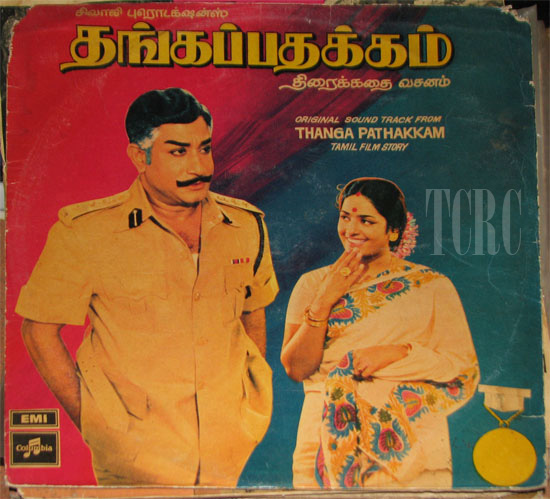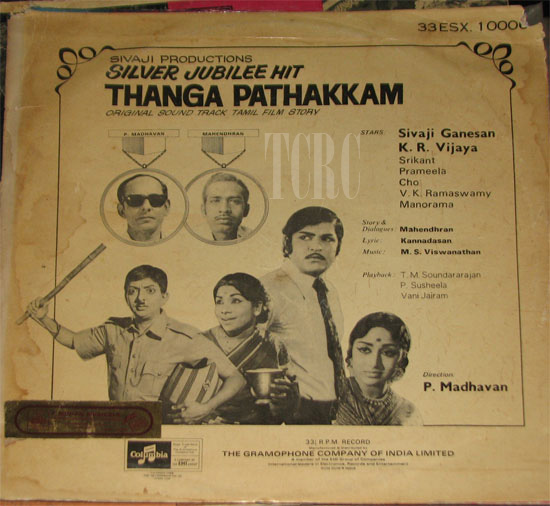By Karthik Bhatt
Chitralaya Gopu is one of Tamil cinema’s most well-known humour writers. His association with his classmate and close friend from school, the legendary director CV Sridhar and his unit Chitralaya has been responsible for some of Tamil cinema’s most memorable movies such as Then Nilavu, Nenjil Or Alayam, Policekaran Magal and the evergreen Kadhalikka Neramillai.
Unlike many of his colleagues from the film world who came from a theatre background, Gopu’s association with stage came about quite by chance. “It was the time of the Chinese aggression. The Tamil Nadu Government requested Sivaji Ganesan and Sridhar to arrange for an entertainment programme involving all the top stars of that time that could be staged across all the major districts of the State for fund raising. I was asked by Sridhar to write short plays for the programme. I wrote two pieces, one a ten minute skit involving Gemini Ganesan and Savitri titled Naveena Dushyanthan Sakunthalai and the other, a multi-starrer 45 min play about a man and his attempts to get his four daughters married. This was Galatta Kalyanam, which was later made into a movie by the same name. It was my first proper attempt at stage plays”, says Gopu.
“It was around this time that an amateur theatre troupe called the Unity Club was functioning in Triplicane”, he continues. “Primarily comprising members who were lawyers or employed with various offices, its star attraction was Major Sundararajan. Following his exit, the troupe was on the lookout for a suitable replacement, who could help their cause with obtaining performance opportunities. Thanks to my film connections, I was roped into the troupe by my cousin who was its secretary. I managed to get Manorama to act in a script written by Ananthu, who was part of K Balachander’s unit. Since I had approached her to be part of the troupe, I was given a role in the play too. It was probably a way of ensuring that I was committed to be present at all times”, chuckles Gopu, who soon started writing full-fledged plays. The troupe continued its journey continued with fairly successful plays such as Sreemathy and Dhikku theriyadha veetil. Its biggest hit was however Kaasedhaan Kadavulada”.
The story of Kaasedhaan Kadavulada revolved around the matriarch, the boss of a wealthy family. The second wife of a henpecked husband, her miserly ways cause great consternation with the son of the first wife and his cousin, who forever look for ways to make her part with the wealth. Taking advantage of an opportunity that arises with the news of the arrival of a Swamiji to their home, they enlist the services of a petty thief turned tea shop owner, a childhood friend to impersonate him and steal the money. The hilarious sequence of events that follow his arrival form the crux of the story.
“By this time, we had managed to rope in the likes of Muthuraman, Venniradai Moorthy and V Gopalakrishnan to act in our plays. The first three were part of Kaasedhaan Kadavulada. Muthuraman played the role of the son, while Venniradai Moorthy played his father. The role that was the biggest hit was however that of the Swamiji. It was essayed by Ramani, a popular mimicry artiste who was a colleague of K Balachander at AGS office and also a part of Ragini Recreations. Manorama played Muthuraman’s love interest”, remembers Gopu.
The play was a resounding success. AV Meiyappa Chettiar and his wife enjoyed it immensely and their sons watched it in succeeding shows. “Manorama told me that it was sure to be made into a movie, as the entire family had witnessed the play. Sure enough, I was soon called to AVM Studios. AV Meiyappa Chettiar was particular that I direct the movie. It marked my debut as a director. Muthuraman and Venniradai Moorthy reprised their onstage roles. As Manorama was not a regular heroine artiste, she was made the matriarch of the family, while Lakshmi was brought in to play Muthuraman’s love interest. For the pivotal role of the Swamiji, the name of Thengai Srinivasan was suggested, to which I readily agreed. The onstage success of the character was replicated on celluloid. A huge hoarding of Thengai Srinivasan was put up by AVM at Pilot theatre, where the film was running to packed houses”, recollects Gopu.
One of the highlights of Thengai Srinivasan’s performance was the gibberish he speaks in an effort to pass it off as Sanskrit.In the video clip below, you can see him even uttering the names of all the actors in the scene as he enters!
An interesting anecdote revolving around the play which was written about in the media was the death of a man who had come to watch one of the shows. His hearty laughter apparently caused him seizures due to which he had to be hospitalised, only to pass away shortly after!
That the movie attracts a great fan following and continues to be regularly shown on television channels to this date is perhaps the greatest tribute to the genial Chitralaya Gopu and his brand of clean humour.
The play has been recently revived by YG Mahendra’s UAA, with a few modifications by Gopu’s son, Chitralaya Sriram.
(Special thanks to Chitralaya Gopu for his inputs and to his son Chitralaya Sriram for having facilitated the interview).




